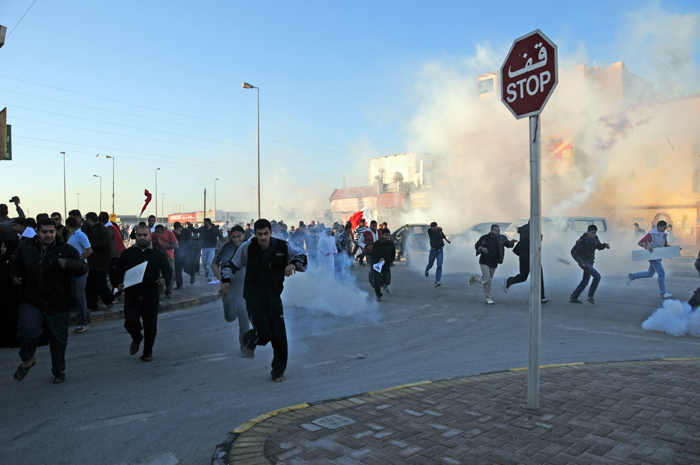By Peter Bogdanich
December 4, 2015
This Saturday, the U.S. triathlon promoter Ironman will hold its first competition in the Middle East. But by choosing Bahrain as its host, Ironman is teaming up with a royal family that has arrested top athletes and thousands of others who called for political reforms.
 Ironman’s half-marathon “Middle East Championship” is set for December 5th in Bahrain, an island monarchy located off the coast of Saudi Arabia in the Persian Gulf. The local partner for the event, Sheikh Nasser bin Hamad al-Khalifa, is a prince who stands accused of calling for and overseeing the arrest of major Bahraini athletes who participated in demonstrations for democracy and reform.
Ironman’s half-marathon “Middle East Championship” is set for December 5th in Bahrain, an island monarchy located off the coast of Saudi Arabia in the Persian Gulf. The local partner for the event, Sheikh Nasser bin Hamad al-Khalifa, is a prince who stands accused of calling for and overseeing the arrest of major Bahraini athletes who participated in demonstrations for democracy and reform.
In February of 2011, thousands of Bahrainis took to the streets of the capital city to call for democratic reforms in largely peaceful protests. Security forces responded with tanks, tear gas, and live ammunition. Dozens of peaceful protesters were killed, and thousands were subjected to arbitrary arrest.

Authorities even targeted top athletes who had taken part in the demonstrations. In a 2011 documentary, The Athletes of Bahrain, ESPN interviewed some of the more than 100 athletes, referees, and sports journalists who were allegedly detained or suspended from competition due to their participation in demonstrations.
On camera, one internationally ranked Bahraini table tennis player recounted his terrifying experience in detention: “There was a special room for the torture. They would bring an electrical cable, blindfold the person and put them on the floor.” A sports journalist who had participated in a demonstration calling for press freedom had a similar account, “I was blindfolded. I couldn’t see what was happening. He put a cable in my hand and said, “Now, I’ll turn the electricity on.” Although one soccer star who was interviewed in the documentary has recently recanted his claims that he was mistreated while in custody, one can only imagine what kind of pressure he was under to change his story.
Ironman’s local partner in Bahrain, Prince Nasser, encouraged this crackdown on athletes. On April 5th, 2011, a pro-government television talk show aired a special report on the athletes who had participated in demonstrations. Using footage obtained at one of the protests to identify the athletes, the hosts criticized the athletes as criminals and traitors. Prince Nasser himself phoned into the program with a chilling warning: “Bahrain is an island with no escape passage, everybody who interfered in these issues will be punished and everybody who took a stand [supporting the regime] will be rewarded… the people who stood with or against the king are well known to us.”

Five days later, the government news agency published an article with the wordy title, “Sheikh Nasser Issues a Decree Forming a State Commission of Inquiry into the Abuses that were Issued from Employees of the Sports Movement.” Although the Government of Bahrain now denies that the commission ever formally met or pursued the charges, the arrests of athletes still occurred, casting doubt on their denials.
As a son of Bahrain’s king, Nasser’s involvement with sports didn’t begin with Ironman. His official titles include: “Chairman of the Supreme Council for Youth and Sports,” and “President of the Bahrain Olympic Committee.” In April 2015, Nasser even announced the formation of his own triathlon team, Bahrain Endurance 13, made up of elite endurance athletes from around the world.

Bahrain’s ruling family hungers for glamorous competitions that can help reset their brutal public image. The government’s press releases proudly publicized Nasser’s involvement with planning Ironman’s arrival. But even before Ironman, Bahrain hosted annual international Formula One racing competitions in the capital city of Manama, a place where public protests have been banned.
International sporting events have always struggled with the tension between fostering global community and the challenges of money and geopolitics. At their best, such events enable people around the world to share a moment together as they learn about each other’s lives and expressions of culture. But in an imperfect world, they can just as easily be hijacked for less than ideal purposes.
Ironman is undermining the values of international competition through its affiliation with a brutal dictatorship. Bahrain’s ruling family has had no qualms about ending the careers of athletes who dared to speak their minds. That same ruling family should not be allowed to “fix” its international reputation by hosting an Ironman triathlon.
Peter Bogdanich is a research associate with Freedom Forward, an organization focused on ending U.S. support for dictators, kings, and repressive governments. Freedom Forward will formally launch in 2016.





